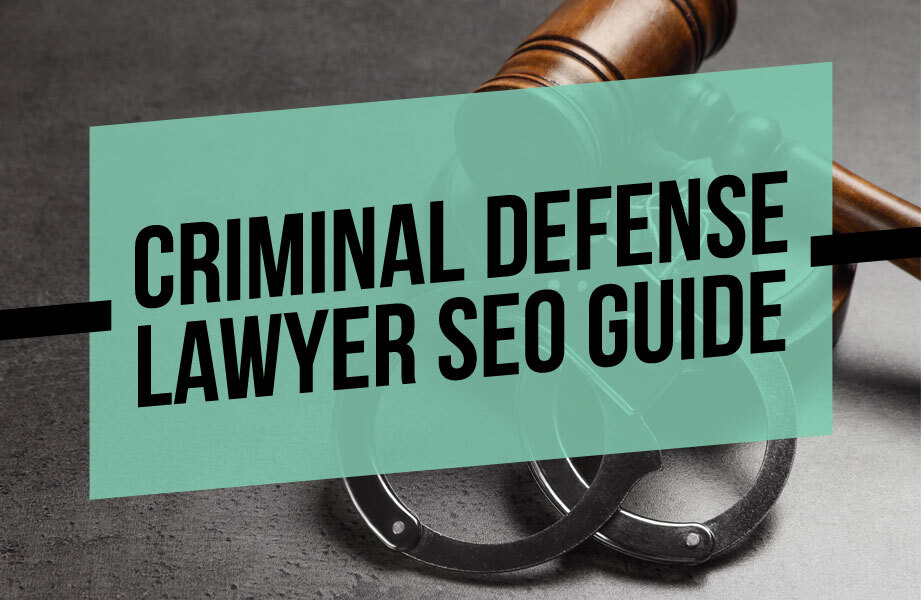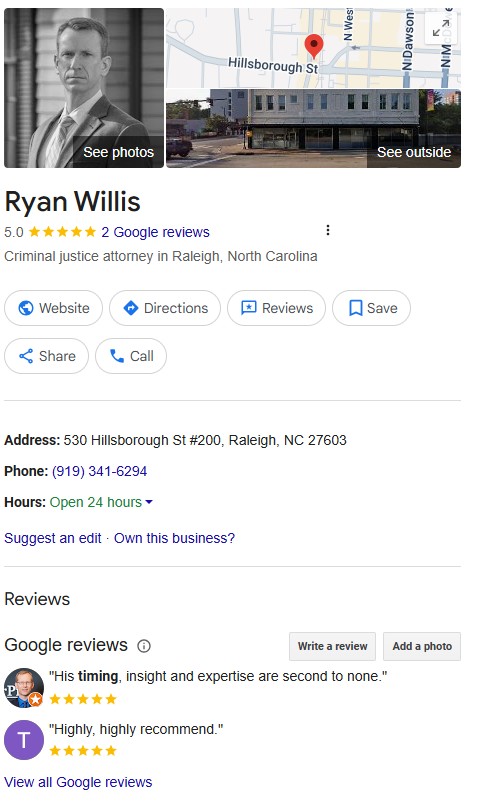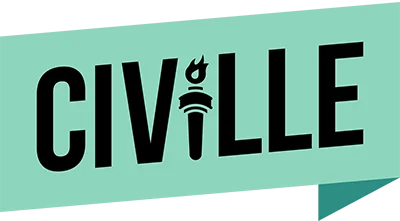
SEO is the art of getting found within search engines. Getting found is already difficult if it were just your firm that was trying to get found in your field, but you also have all your competitors, blogs, Reddit, and countless other sites and resources all trying to carve out their own share of the Internet rankings. How are you to compete? That’s what this guide is designed to help you with. From federal law to traffic defense, we will go over some of the basics and get into the nitty gritty to help you find digital success with your criminal defense law firm.
What Makes Criminal Defense SEO Different

Before we jump into the “how-to,” let’s be clear: getting found online as a criminal defense lawyer is a different beast. You’re not selling widgets or casual services. People searching for you are often in the middle of one of the worst days of their lives. They’re scared, they’re stressed, and they need help right now. This changes everything about how you approach your online presence.
Think about it: that urgency means they’re grabbing their phone, maybe even from a police station waiting room, and frantically searching. That search is almost always super local—they need someone in their town or county. And because their freedom or future could be on the line, trust, discretion, and a sense of authority are absolutely everything. They need to feel, instantly, that you know what you’re doing and can be trusted. On top of all that, what are the search terms you’re targeting? They’re usually very competitive. So, a smart, organic SEO strategy isn’t just nice to have. It’s how you connect with people in crisis without breaking the bank on ads.
Your Website: More Than Just an Online Brochure
Your firm’s website is ground zero for all your online efforts. If it’s clunky, slow, or confusing, anything else you do for SEO will feel like swimming upstream. Especially in criminal defense, your website needs to be a high-performance lifeline.
What does that mean? First off, speed and a flawless mobile experience are king. Seriously, if someone’s in a panic, trying to find a lawyer on their phone, they will not wait for a slow site to load. Every second lost is a potential client gone. A fast-loading site that looks and works perfectly on a phone—the kind of site Civille focuses on building—means you’re not losing people to basic frustration. Google cares about this, too. Speed and mobile-friendliness are big deals for your rankings.
Then there’s just making it easy for people to find what they need. When someone is stressed, their ability to navigate a complicated website plummets. They need to quickly see what kinds of cases you handle (DUI, drug charges, assault, etc.), who your lawyers are, and most importantly, how to get in touch with you immediately. You want clear, 24/7 contact options. And, of course, make sure your site is secure with HTTPS. It’s a small thing that builds a lot of trust.
Speaking Their Language: Finding the Keywords Real People Use
Good SEO means knowing the exact words and phrases people type into Google when they’re looking for a criminal defense lawyer. This isn’t just about “criminal lawyer [city].” You need to dig deeper. Think about keywords that show someone is ready to hire, like “felony assault defense attorney in Chicago,” or “lawyer for first OWI Boston.”
And don’t forget long-tail keywords. These are longer, more specific questions people ask, like “what happens if you refuse a breathalyzer in California?” or “can I get my record expunged for a misdemeanor drug charge?” Fewer people might search these exact phrases, but those who do often have a very specific, urgent need and are much more likely to become clients. Answering these questions on your website can be incredibly effective. Tools like Google Keyword Planner, SEMrush, or Ahrefs can help uncover these terms, but also just listen to the questions your current clients ask.
Making Your Pages Work Harder: Smart On-Page SEO
Once you know what people are searching for, you need to make sure your website pages actually use those terms in a way that makes sense to both people and Google. This isn’t about just stuffing keywords everywhere, that actually hurts you.
Your page titles and the little descriptions (meta descriptions) that show up in Google search results are your first handshake. They need to be clear, compelling, and give people a reason to click your link over someone else’s. Inside the page, use headings and subheadings to break up your text and make it easy to read. Your main page title (the H1) should clearly reflect what the page is about, and subheadings can address specific aspects or related questions.
The heart of it all is helpful, client-focused content. Each page should provide real answers and valuable information related to what that person searched for. Write like you’re talking to a real person who’s stressed and confused. Use plain language, not dense legalese. Weave your keywords in naturally where they fit.
And don’t forget your images. Give them descriptive names and “alt text” so Google knows what they are, which also helps people using screen readers. Finally, link relevant pages together within your site. If you have a blog post about what to expect at an arraignment, link it to your main “criminal defense services” page. It helps people find more information and shows Google how your content is connected.
Winning Your Local Area Online: Local SEO Essentials
For most criminal defense lawyers, your clients are coming from your local community. Being the top result when someone searches “criminal lawyer near me” is huge.
Your Google Business Profile: Your Local Digital Storefront

Your Google Business Profile (GBP) listing is probably your most powerful tool for local search. It’s often the first thing people see. Make sure it’s perfect:
- Name, Address, Phone (NAP): This has to be the same everywhere online. On your GBP, your website, every directory. Consistency is key.
- Categories & Services: Be specific. Don’t just say “lawyer,” use “Criminal Justice Attorney,” “DUI Lawyer,” and list out all the specific types of cases you handle.
- Description & Photos: Write a good description of your firm. Add real photos of your office and your team. All of this helps build trust.
- Posts & Q&A: Use Google Posts to share quick updates or links to new blog content. Also look at the Questions & Answers section and answer common questions proactively.
The Power of What Other Clients Say
Client reviews on your GBP and other sites are incredibly influential. When someone’s facing charges, hearing from others you’ve helped can be a lifeline. After a case wraps up successfully, have a simple way to ask happy clients if they’d be willing to share their experience online. Just as important, respond professionally to all reviews. Thank people for positive ones. For negative reviews (they happen), respond calmly, express empathy, and try to take the conversation offline to resolve the issue. How you handle criticism says a lot.
Show Up Where Locals Look
Make sure your firm is listed correctly in other local online directories and legal-specific ones like Avvo. If you serve several distinct towns or counties, create separate pages on your website specifically for those locations (e.g., “Denver Drug Charge Defense”). Someone in Denver wants to see that you specifically serve Denver.
Read More: How Local Blogs Can Build Your Firm’s Local Presence
Content That Builds Trust and Shows You Know Your Stuff

Good content is the fuel for your SEO, especially when it comes to showing Google (and potential clients) your expertise and trustworthiness (that E-E-A-T thing Google loves). For criminal defense, your content needs to do more than just hit keywords. It needs to be a genuine resource for people in distress.
Create in-depth guides on specific charges—think “Your Rights After a DUI Arrest in Texas” or “What to Expect When Facing Federal Charges.” These “pillar” pages should answer as many questions as possible. Use your blog and FAQ sections to tackle more specific questions, explain confusing legal procedures in simple terms, or discuss how recent law changes might affect people.
Crucially, always address the fear and uncertainty your clients are feeling. Use language that’s understanding and reassuring. Your goal is to provide helpful information that builds trust and subtly positions you as the expert who can guide them, not to hard-sell them. (And always include a disclaimer that your website content isn’t a substitute for actual legal advice on their specific case!)
Earning Trust Signals: Smart Link Building
Links from other reputable websites to yours (backlinks) tell Google that your site is a trusted authority. But you have to earn these the right way. Think about local connections. Sponsoring a local community event or a youth sports team might get you a link from their website. Being active in local business associations or legal groups can also lead to legitimate links. Listings in well-respected legal directories are also good sources. It’s about building genuine connections and becoming a recognized part of your legal and local community.
Keeping the Engine Running Smoothly: Technical SEO
This is the “under-the-hood” stuff that helps search engines like Google easily find, understand, and rank your website. You need a logical site structure so pages are easy to find. Make sure Google isn’t accidentally blocked from crawling important parts of your site. Using Schema markup (a type of code that gives Google more detailed info about your firm, like that you’re a LegalService and an Attorney specializing in criminal defense) can also help your site stand out in search results.
Beyond Just Ranking: Turning Visitors into Actual Clients
Getting to the top of Google is great, but it’s only half the battle. Your website needs to make it incredibly easy for someone who’s stressed and looking for help to actually contact you.
This means having crystal-clear calls to action. Don’t make them guess what to do next. Use direct language like “Call Us 24/7 for a Confidential Consultation” or “Tell Us About Your Case Online.” Make these buttons or links stand out. Your phone number should be impossible to miss (and clickable on a phone!) on every single page. Offer a simple contact form. You can make your forms appear even simpler with multi-step forms that breakdown your firm into multiple easy to answer questions. Some firms find live chat helpful for those immediate questions. The overall design of your site should feel professional and build confidence, not add to their stress.
Read More: Civille’s Law Firm Lead Enhancement
Knowing if It’s Working: Tracking Your SEO Success
You need to know if all this effort is actually paying off. Track key things like where you’re ranking for your important keywords, how much organic traffic (visitors from search engines) your site is getting, and how people are behaving on your site (are they sticking around or leaving quickly?). Most importantly, are you getting more calls and contact form submissions from people who found you through search? Tools like Google Analytics 4 and Google Search Console are essential for keeping an eye on this.
Civille: Your Partner in Getting Found When It Matters Most
Trying to manage the complexities of criminal defense SEO while also fighting for your clients in court can feel overwhelming. That’s where we come in. At Civille, we get the unique pressures and urgent needs of criminal defense firms. We build fast, secure websites that are designed from the ground up to connect with people in crisis and convert them into clients. Our team lives and breathes SEO for lawyers, from dominating local search to crafting content strategies that build real trust and authority.
If you’re ready to make sure your firm is highly visible online so you can help those who desperately need your expertise, it’s time to talk to Civille. Let’s build an SEO strategy that gets real results for your practice.





